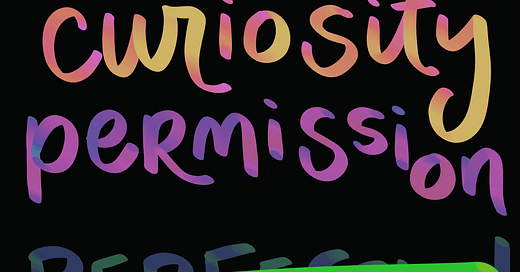I’ve been having a lot of conversations lately about hobbies and extracurricular pursuits, and the value in doing things simply for the fun of it rather than for monetization or a particular goal.
And I’ve been thinking about failure tolerance and how the concepts of fun and failing can go hand in hand.
recently delved into what she calls the Failure Tolerance to Perfectionist scale that places each tendency as the endpoint on a spectrum.She writes:
For a Failure Tolerant person, there is no such thing as an unfortunate end. A loss. A finale. One door opens the next, and even if the tide is low now, Failure Tolerants know that eventually (if you stick around long enough) the waters will rise again.
And on the other end:
Perfectionism high scorers are painfully self-aware. This results in a near-constant mental hum of brutal judgement, which makes you afraid to act and also drowns out whispers of inspiration from the Muse. Double homicide!
Weirdly enough, even though one of my Human Design profile lines is all about trial and error and learning from life experience, I’ve always considered myself to have a low failure tolerance and a high perfectionist streak.
Raised as a pathological people pleaser and ingrained to believe that anything less than an A grade was something to be ashamed of, I’ve had a very difficult time separating my inherent self-worth from my output. And my inner critic is bru-tal.
Part of the reason I’ve embarked on the Taylor Swift Surprise Songs Sets project is to increase my failure tolerance for playing without the need to self-correct and to give myself accountability for practicing on a regular basis.
I’m not doing the sets live to perform for an audience or to get external validation for how “well” I’m playing them, I’m doing it because I know I’m going to mess up and I want to be OK with messing up and letting that evidence rest out there in the world.
It’s low-stakes, I admit, to practice high failure tolerance with a hobby, but what about when your ability to pay the bills is involved? That’s where the perfectionist shame kicks in.
Which leads to another essay I’ve been pondering, “Learning To Play Piano When There Is No Recital” by Kelsey McKinney. (Another long read, sorrynotsorry.)
In it, McKinney relates her difficulty in pursuing creative hobbies that are separate from creative work — or as she poses it:
“What does creativity even look like when your whole job is already to tell stories and make jokes and be silly? How do you do anything with a goal entirely separate from the life you’ve chosen to live?”
Like McKinney, I remember quitting a lot of things as a kid: violin lessons, Girl Scouts (fifth grade bitches are probably where my inner critical voice came from), golf and tennis lessons, none of which I regret. That wasn’t where my creative spark was flowing.
But somewhere along the line, the creative projects that fulfilled me — visual art, writing, cooking — became my creative work, and when money started being assigned to them, the fun leached out. As McKinney writes, “[W]hen creating is your job, when it becomes a form of profit and livelihood and no longer a form of curiosity, it is easy to forget how it feels to stretch your brain.”
The tipping point where creativity turns into a monetizable hustle is a sharp and painful one in my world. It really hurts me personally when a project I’ve put a lot of time and thought and love into doesn’t connect with an audience, or when the output of a career is diminished and dismissed as not financially valuable to others. (Yes, I’m talking about the work and skill of recipes here, for one.)
I have some creative projects incubating that I’d like to put out into the public sphere. I want them to succeed. I want others to see value in them. I don’t want them to live in the vacuum of my mind.
But I’m still trying to strengthen that tolerance muscle and be OK with failing and taking it as an iteration, not the end of everything. So I need a place to be not-so-great and to be curious without consequence. And that’s where I can use my hobbies to bolster me.
Playing ukulele isn’t just a tool to switch my brain into a different gear after a long day —although it does that too! — it’s a way to be experimental and non-judgmental, if I allow myself to be. It’s practice for finding the fun in life again.
Maybe for you, that thing is practicing yoga. Or writing historical fiction. Or playing pickleball. Or participating in Making Art Everyday.
Whatever it is, I hope you embrace it and appreciate it for what it is. Hold it in a special place and remember how valuable it is to be a messy creative on a regular basis.






Love this, especially the notes on the value of recipes. Another layer here, especially for those of us whose work is food, is how our interest (hobbies, work) benefit sour families and often mean sour labor gets minimized. Maybe I'm projecting a lot of what it means to be the primary cook for my family who also wants to find time to bake for fun.
I have a very high tolerance for failure but my perfectionist tendencies mean I often stuff away the failure feelings (sadness, rage, disappointment) in order to come across as "good at failure" LOL.
Thanks for sending this my way!